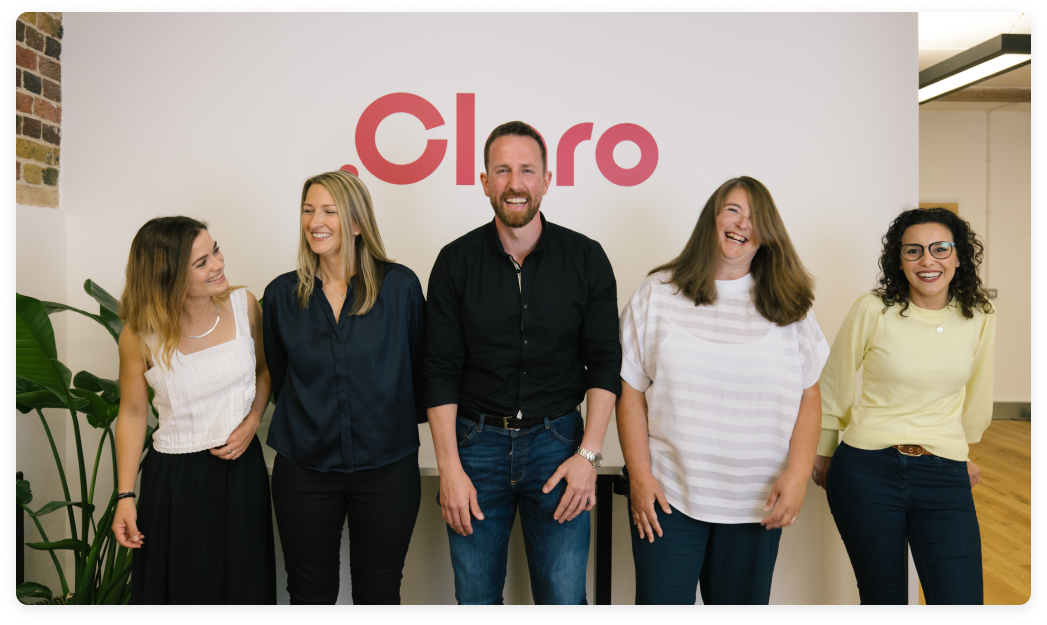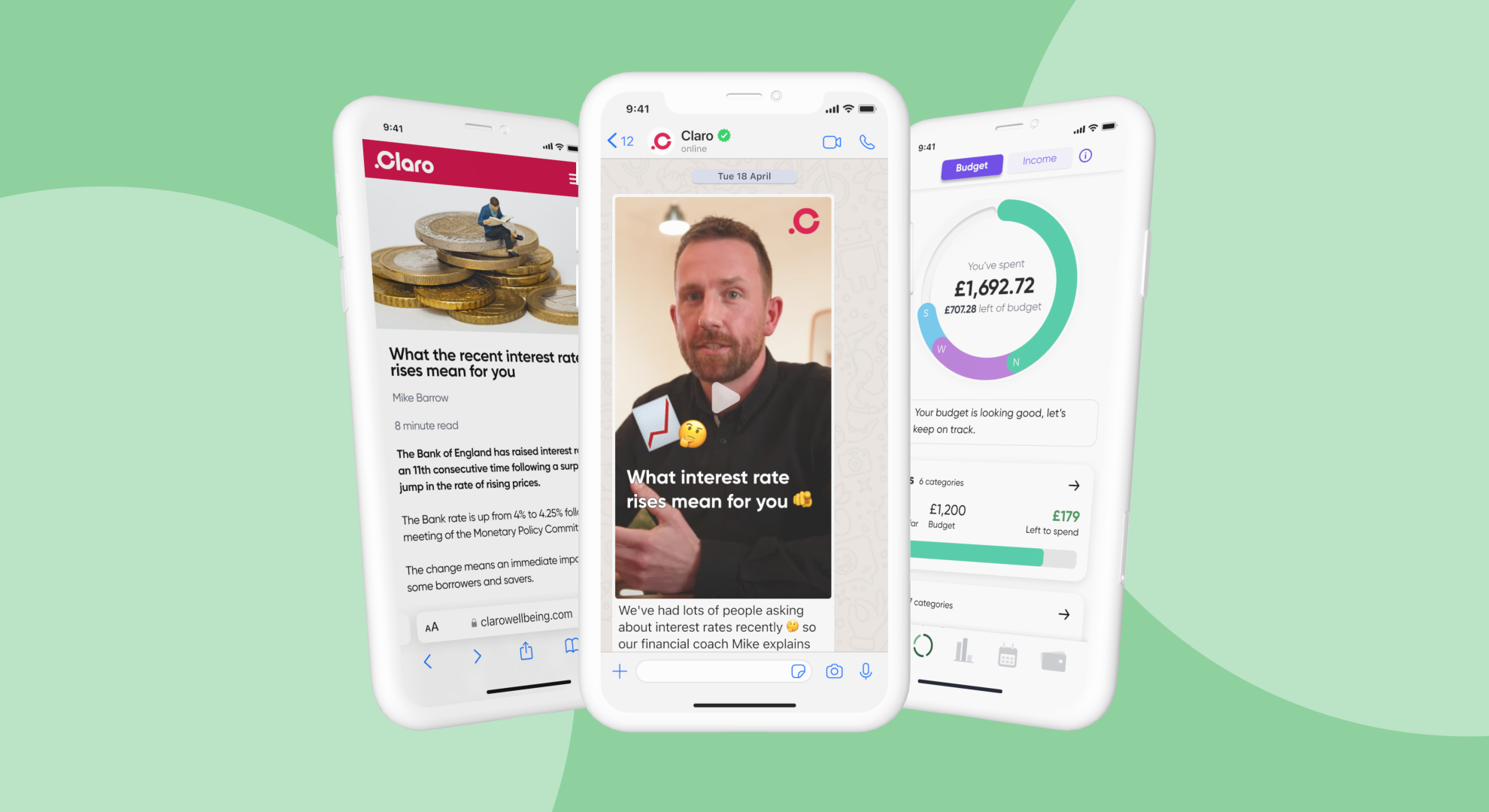6 min read
Should employers acknowledge Blue Monday?
Blue Monday (15 January) has a mixed reputation. But there’s still value in using the day to raise awareness of mental health and wellbeing...
7 min read
Ciara Knight
22-52-2022

Financial literacy is a term that’s growing in prominence in the wellness space over the last few years, but what does it actually mean? And why is it so important?
To gain some expert insight, we sat down with three of Claro Wellbeing’s in-house financial coaches, Sarah Brill, Stacey Lowman and Mike Barrow. With their wealth of knowledge around all things money-related, they generously shared their thoughts on financial literacy.
Sarah: “If you don’t manage your own finances, who’s going to manage it for you? Who does the responsibility of your finances sit with?”
Stacey: “To build the resilience that we need to live in society, we all have our own opinions on how money is managed. Living through COVID, the cost of living crisis and the credit crisis, it all demonstrates that money can’t buy you happiness. When things go wrong, it’s helpful to have resources to get you through difficult times. Building that resilience is hugely important. From a confidence perspective, it’s vital to feel like you have a choice in how you want to live your life. Usually, we require money for the things we want to do. There are huge correlations between how we feel mentally and our financial health. It’s interrelated - our physical health, our mental health, our general wellbeing, how we show up in relationships, even at work, there’s a connection with how we feel about our finances.”
Mike: “You have to manage it yourself, or pay someone else to do it. Managing your own finances saves you the job of finding a financial advisor. Advisors typically have entry barriers in terms of requiring you to have a minimum level of investable assets such as cash or stocks and shares. Because of the fees involved, you often need anywhere from around £100,000 in savings to get started with a financial advisor. It’s also important to have a good understanding of a subject, such as money, that is so relevant to every single person. Everyone needs money to pay for things, regardless of their situation. A better understanding of finance lets you deal with all sorts of things more effectively. Someone financially literate often has a far easier time than someone who doesn’t have a clue. You’ll get to know your own habits and money management in general, which will help in the future.”
Sarah: “We often assume people want the same things as we do. But what is smart to one person isn’t necessarily smart to someone else. It’s subjective and based on the individual. Money allows us freedom, it’s the vehicle that allows us to achieve what we want to achieve.”
Stacey: “Money is related to most areas of our lives - career, how we progress, activities, how we spend time, where we choose to live, health and resilience of families, even how we support others. It’s such a helpful resource to achieve all those things. It gives you the freedom to make choices and feel like you have a choice in the direction that your life goes in. Unforeseen things happen all the time - the cost of living crisis and COVID, relationship breakdowns, poor health - all these unexpected things can happen and it’s important to be able to navigate through using money effectively as a resource.”
Mike: “If you don’t have a smart money mindset, you’ll find yourself in a sticky situation for a lot of things. Whether we like it or not, everyone has to deal with finances. We all have some kind of income (work, benefits, salary, pension, etc) and being able to manage that in the best way will make life easier. With things like day-to-day spending, holidays, etc all the way through to planning for the future, having a good grasp on your finances and an honest transparency with yourself will make everything more manageable. Skills, knowledge and familiarity with self make it easier to do the things you want to do. You’ll struggle without it.”
Sarah: “The best place to start is by creating awareness. Sometimes we prioritise improving something, but it may actually be about something else. If someone wanted to improve their finances, I’d ask what it is they want to improve. What’s their current situation that’s not serving them in the way that they’d like? If you’re not sure what you want to achieve, it’s like shooting in the dark. It might be to get out of debt, save for a wedding or car and then create awareness around what’s currently stopping you. We all have blind spots, so we want to look at what you need to overcome to improve your finances.”
Stacey: “Get a really clear picture of your current situation - do I understand right now where I stand financially? Do I understand what I’ve got? What do I owe? What my options are if I wanted to make changes today and where I could get to? Then, identify the key areas you want to focus on. Get really specific. I want to understand where my savings are, the features of this account and what the interest rate is. At a micro level, build up that knowledge. Ask yourself questions that are as specific as possible, building the foundation of financial literacy. Hone in on that awareness around what specifically would be really helpful for me to know and understand. It can be aspirational. Set your next steps and actions. Understanding your current financial situation will help inform your next steps.”
Mike: “It really depends on where you are, as everyone is in a different position. There is a general group of ideas, whether you’re at the beginning, middle or end. A great place to start is to look at the fundamental idea of optimising your budget. Whatever your situation, having a better budget makes every goal easier. Get to know your habits and minimise unnecessary expenses so your disposable income goes further. Once savings have been made, put that money towards whatever your goal is. Then look at reducing high-interest debts. Look at emergency funds, which are a pot of cash savings to use as a safety net with generally at least three months of core expenses in case of unexpected costs. Once you’ve got a solid foundation, optimise your workplace pension if you are employed - it’s tax efficient and, if you have employer contribution matching scheme, even better. Look at short-term savings goals, start saving quickly if you have a wedding or holiday. Choose the account you want for cash savings and make regular contributions to get there. Beyond that, look at the world of investments, property, stocks and shares, buy to let property, etc, and longer-term thinking once the initial foundation is sorted.”
Sarah: “A lot of financial literacy comes from parents, friends, colleagues, family and everyone has a different attachment style to money. The UK education system doesn’t necessarily educate from an early age about how to manage pocket money or manage university maintenance loans. All those habits we learn from other people, very early on, before the age of seven. When we go out into the world, we’re not necessarily armed with the tools we need to manage money effectively. That doesn’t mean there isn’t financial education in the UK, there are places people can go to receive information, like the internet. In terms of actual education, the UK doesn’t really have a space where people can explore, unless it’s in a business context at university. A shift needs to happen, as many can end up in situations that mean their finances aren’t in the best state.”
Stacey: “From the research I’ve seen (including Claro’s), it seems that financial literacy isn’t where I would want it to be for the UK population. It’s incredibly important that we all understand the impact of these soaring inflation rates, why the economy has taken the direction it has post-pandemic, not only to understand what it means to the individual and what we can do to improve our current situation, but to collectively see money in society and how it shapes the future we all get to live in. We vote every time we spend, save and invest. We are voting for the future we want and the way we’re going to live. It’s fundamental for the health of individuals and society to improve our financial literacy. It gives us choice, knowledge and power.”
Mike: “Absolutely not. It’s not generally on the school curriculum. We leave school and it’s no wonder people get into debt. They’ve suddenly come from being taught things that have nothing to do with money management. They get a job for the first time, don’t understand the payslip and want to go and spend it all. Fundamental resources to teach us about finances as early as possible would help. If a child comes out of school today, their parents went through the same thing - they weren’t taught it either so they’ve nothing to pass down in terms of financial knowledge. It perpetuates through generations - they have to be self-taught or they’ll never learn it. UK financial literacy is lower than it should be to make the most of our situations. From an individualist point of view, the level of financial education should be increased.”
Sarah: “It’s about benchmarking yourself against others. What are you testing it against? It’s also about benchmarking against yourself and how literate you want to be? Some don’t want to be. Some love to know every penny they spend. Whatever works for you and brings you peace of mind. Some like to read, some like to consume information via video content, and if we want to test ourselves, there are places you can go.”
Stacey: “There are various tools you can use to do that. As part of Claro Wellbeing’s financial wellbeing platform, we have a financial health score, which employees can use to get a clear picture of where they’re at right now in terms of finances, the areas where they have good knowledge and which need improvement. Doing a test like this can help inform the areas you need to focus on and it allows you to retake it as you improve your finances and/or literacy.”
Mike: “First, it starts with a general feeling. People know straight away if they’re out of their depth when speaking or reading about finance. To improve knowledge, now is a good time to get into it. There are a lot of people online using tools to make the topics more engaging and accessible through snippets and videos. YouTube can be a great place for this kind of thing. Be sure to find the balance between correct and useful information with well-made, entertaining videos. Damien Talks Money does it very well. Social media is a good starting point to find content that will get you started on budgeting, saving and investing. Be careful, as guidance is unregulated. You may find that some people don’t know what they’re talking about or are trying to sell you something. The majority of these people are transparent, but be careful. The content can be as basic as cash savings, how to use a credit card, what to do with budget, how to get through the cost of living crisis. You’ll get into the swing of finding information and gradually build up a knowledge base. Things that didn’t make sense before suddenly do, and they’re easier than you might have thought. Use it to your advantage if you’re prone to social media. If not, start Google searches, YouTube searches and find the content you like, whether it’s video, reading books, audio books, find the area you want to digest content in. Get started on one subject and it will snowball."

6 min read
Blue Monday (15 January) has a mixed reputation. But there’s still value in using the day to raise awareness of mental health and wellbeing...

4 min read
Ever wished you had a money-whiz friend you could ask anything, as often as you like?

7 min read
Millions are being impacted by financial stress. Yet, until now, workers in frontline occupations have not been able to benefit from educational...